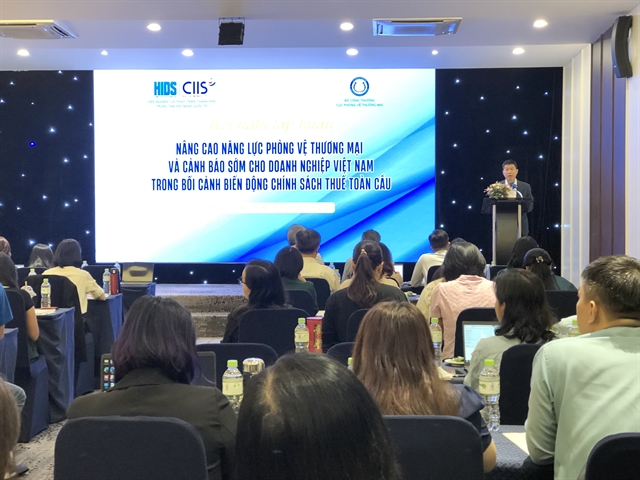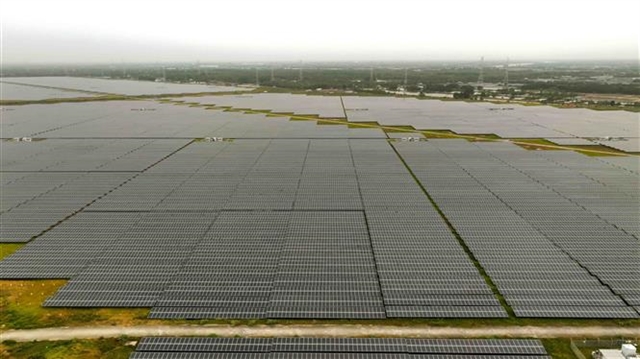Vietnamese exporters urged to strengthen trade defence amid rising global protectionism
Amid global tax volatility and rising protectionism, Vietnamese enterprises must strengthen their response to trade measures to sustain exports and protect the country’s position in global supply chains, a conference in HCM City heard on May 7.

HCM CITY — Amid rising global tax volatility and trade protectionism, Vietnamese enterprises must urgently enhance their ability to respond to trade remedy measures to sustain exports and protect the country’s position in global supply chains, a training conference in HCM City heard on May 7.
The event, organised by the HCM City Centre for International Integration Support and the Trade Remedies Authority of Vietnam, drew representatives from government agencies, industry associations, and export enterprises.
Speakers said that in 2025, global tax policies will continue to experience fluctuations, and many countries are increasingly employing trade defence mechanisms to protect their domestic industries.
This presents challenges to Vietnamese exporters, who are now facing a higher number of trade remedy investigations that are becoming more complex in nature and requiring more stringent disclosures to importing countries.
According to Chu Thắng Trung, deputy director general of the Trade Remedies Authority of Việt Nam, the global trade landscape has changed a great deal over the past decade with increasing trade protectionism.
Việt Nam has been subject to 286 trade remedy investigations, he said.
Nguyễn Anh Thơ, a specialist at the Trade Remedies Authority of Việt Nam, said the US, India, Canada, and Indonesia are among countries that regularly demand trade remedy, with the US accounting for nearly 50 per cent of all cases.
The scope of products under investigation is also expanding from high-value exports such as solar panels (US$4.2 billion) and shrimp ($800 million) to items of smaller volumes like paper plates ($9 million), molded fiber trays ($50 million), honey, staples, and lawn mowers, she said.

Circumvention investigations are also on the rise, especially in the US, which has already initiated 22 such cases, she said.
In reality, many Vietnamese enterprises still lack the information, experience, and technical capacity needed to effectively respond to trade remedy cases, Trung said.
Many businesses are unable to anticipate risks or stay abreast of shifting policies and investigation patterns in key export markets, he added.
At the conference, experts provided an overview of trade defence instruments, offering practical examples related to anti-dumping investigation processes from initial notification to the submission of responses to investigation questionnaires.
The conference also updated participants on global and regional trends in trade remedies, recent cases involving Vietnamese exporters and practical advice to help businesses mitigate trade risks, especially in major markets like the US, EU and India.
Thơ said both the number and complexity of trade remedy investigations are on the rise.
Many countries are expanding their investigation scope to include unprecedented aspects requiring highly detailed disclosures, imposing tight deadlines and examining multiple actors across the supply chain, she said.
Another key challenge is that Việt Nam has not yet been recognised as a market economy, and, as a result, countries like the US often use third-country surrogate costs when calculating the ‘normal value’ in anti-dumping cases.
This practice increases the risk of higher duties being imposed, with a recent example being the anti-dumping investigation into Vietnamese honey exports to the US, Thơ added.
Nguyễn Hằng Nga, deputy head of the Trade Remedies Compliance Division, and other experts offered several recommendations to businesses.
Before an investigation, enterprises should understand the legal frameworks and procedures for trade remedy investigations in their export markets, monitor early warning systems from the Ministry of Industry and Trade, establish communication channels with partners, business associations, and authorities, develop traceability systems, follow international accounting standards, increase domestic value-added content, and source inputs from countries not facing trade remedy measures.
If an investigation occurs, businesses must fully cooperate with foreign authorities, provide complete information on time, work with industry associations and the trade ministry to build a strong defence, monitor reviews to protect their interests, and prepare for on-site verifications and respond quickly to preliminary findings.
Experts said the growing scope of trade remedy investigations across markets, products, and investigative techniques requires exporters to take a more proactive, strategic approach.
Enhancing trade remedy capabilities is not only a short-term protective measure but also a long-term measure for maintaining and expanding Việt Nam’s exports in an increasingly competitive global market, they said. — VNS





